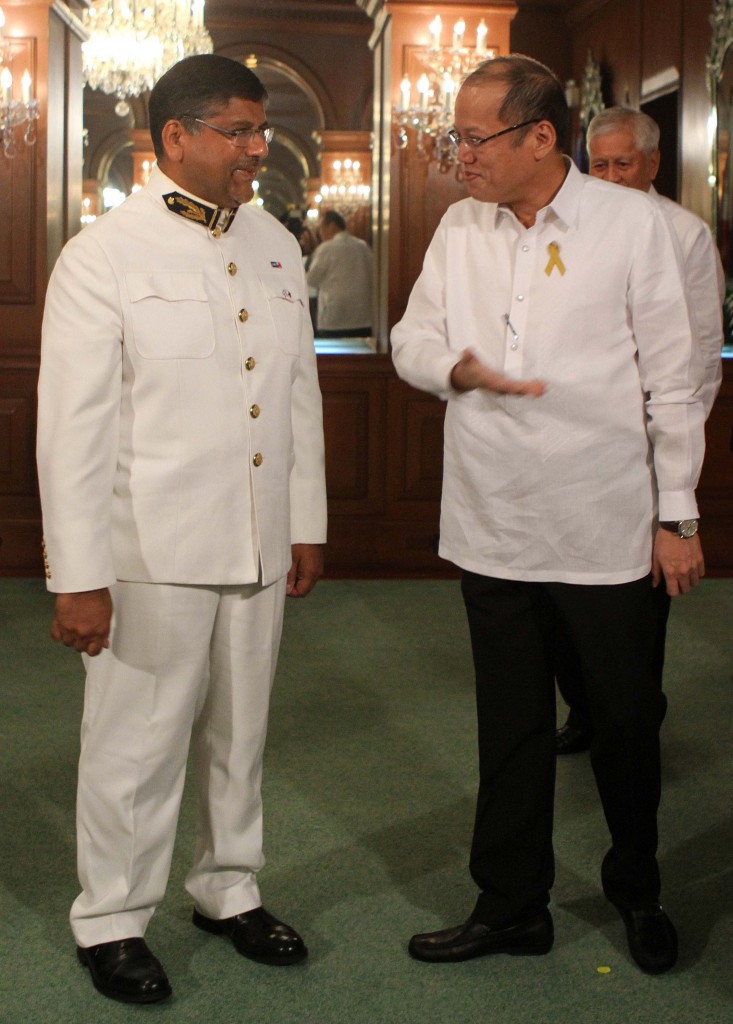
President Benigno S. Aquino III invites H.E. Asif Anwar Ahmad, Ambassador Extraordinary & Plenipotentiary United Kingdom of Great Britain & Northern Ireland for a private talk during the latter’s presentation of credentials in the Music Room of Malacanañg Palace. LYN RILLON/INQUIRER
When one of the British Embassy’s staffers struggled to find the Filipino word for “meeting,” the new ambassador chimed in and said, “pulong.” Then, at a recent reception, someone whispered after shaking the ambassador’s hand, “Sino siya?” The diplomat answered, leaving the female guest in shock: “Nakalimutan mo ako.”
The United Kingdom’s new ambassador to the Philippines, Asif Ahmad, has added Filipino to his foreign language portfolio, enriching a tongue that has gone around the world in his 14 years in the British foreign service.
Ahmad, who speaks Bengali, Urdu, Kutchi, Farsi and French in addition to his native English, made sure to learn more of the Philippine language than just “magandang umaga” (good morning) or “salamat po” (thank you)—obligatory greetings that other diplomats often sprinkle into their speeches and conversations with locals.
“I’ll tell you when I am best in [Filipino]: When someone sits down and says I’m not going to speak to you in English at all. And after about 10 minutes, I can switch off my other six languages and focus on Filipino and make myself understood,” Ahmad said in his first meeting with reporters on Wednesday.
“I’ll prove it to you one day,” said Ahmad, who also tweets in Filipino.
Ahmad, who was appointed Britain’s new mission chief in the Philippines in July in place of Stephen Lillie, trained under a Filipino-born language tutor in London before coming to Manila.
Reviving tradition
Enhancing foreign language training for British diplomats is part of British Foreign Minister William Hague’s program to revive a tradition half a century ago, when British diplomats spoke the mother tongue of their host nations, Ahmad said.
“There was a tradition 50 years ago … progressively, we started to lose that. And then, our budget for language training started to shrink and it was only then left for Chinese and Russian and a few other [languages],” he said.
“This foreign secretary (Hague) came up with a hugely ambitious project. He said that in any country where a language other than English is also spoken, at least half of our diplomats should also aspire to some proficiency in that language,” he said.
For five months, Ahmad learned the complexities of the Filipino language, from grammar to pronunciation. It took a while for him to get the hang of it, comprehending more when spoken to but freezing when it was his turn to speak.
In time, Ahmad acquired the Filipino tongue, passing the British Foreign Service’s language proficiency test with a “confidence level” rating.
Dreaming in Filipino
It’s still the lowest in the three-tier grading system but, for perspective, the highest rating—the “extensive level”—means one could “dream in Filipino,” Ahmad joked.
In the test, which included recounting Philippine history strictly in Filipino, Ahmad got a nearly perfect score of 97 percent in comprehension, 64 percent in grammar, and “around the
It was the kind of training that he did not have the opportunity to get when he was assigned as ambassador to Thailand, his last foreign post, in 2010 when he replaced a diplomat who quit foreign service halfway through his term.
“I have to say, in all honesty, since I arrived in Manila, my (Filipino) has gone worse, not better. I’ll tell you why it has gone backward: Firstly, everyone speaks to me in English. [Secondly], when I start speaking in (Filipino) to my colleagues in the embassy, they all run away,” he said, laughing.
Local habit
Ahmad has so learned Filipino that he has somewhat taken on the local habit of shifting from English to Filipino, at one time translating “on leave” as “naka-off.”
Ahmad showed his Filipino-speaking skills when he presented his credentials to President Aquino on Tuesday. He closed his speech with an entire paragraph in Filipino, which he had written, but tweaked by the embassy staff. He edited the final version and he found two mistakes even after his local staff’s review.
In his remarks before President Aquino, Ahmad expressed his wish for improved bilateral ties between the United Kingdom and the Philippines, citing the Philippines’ importance as a growing hub of operations for the British Foreign Service, using words that Filipinos rarely use, including “mapahusay” (improve), “lumalago” (growing), and “natatangi” (unique).
Ahmad showed the same zeal in speaking Filipino during a recent football game with local children whom he engaged in their own tongue, leaving the little ones amazed at the man whom they did not know was a diplomat.
On Twitter, Ahmad occasionally responds to tweets in Filipino.
Greater trade
With an excellent command of Filipino, Ahmad hopes to spur greater exchanges between the United Kingdom and the Philippines, particularly in trade, during his four-year term.
The United Kingdom remains the Philippines’ largest trading partner in Europe, with nearly $1 billion in annual trade.
Ahmad, a former bank executive who also spent 10 years as Asia director for UK Trade and Investment, said he aimed to further develop trade between his country and the Philippines.
And he emphasized that to on Tuesday: “The first railway network in the Philippines was British and today, the UK is the largest investor from the European Union here. There is even more potential for commercial links to grow.”
“Nais kong pagtibayin ang ugnayan ng ating dalawang bansa,” he said.
Originally posted at 08:59 pm |Wednesday, October 23, 2013